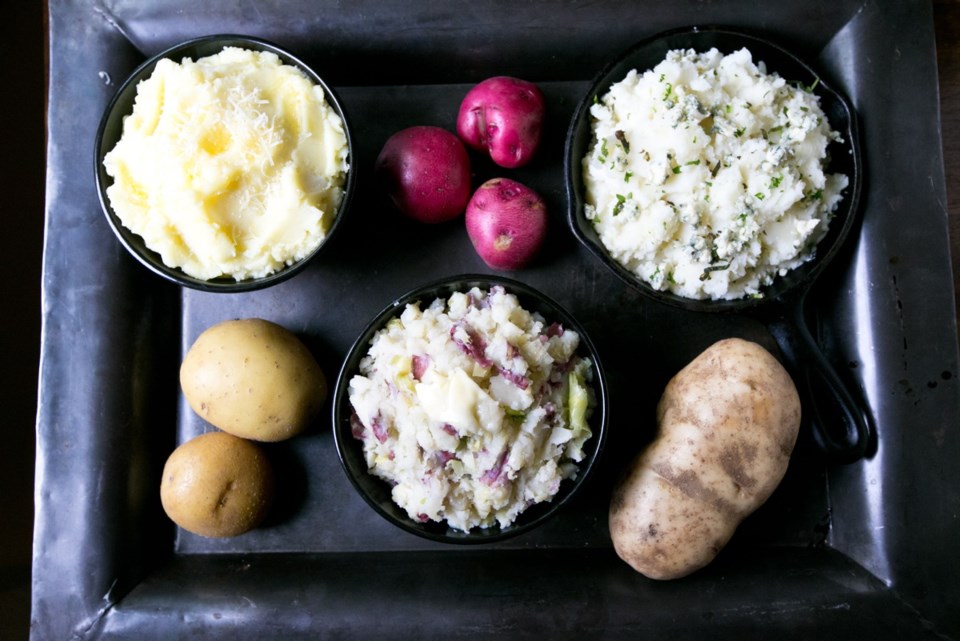 Thanksgiving dinner is just around the corner, and many of us around the Island will soon be mashing potatoes to serve as a side dish for that meal. How the dish turns out will vary, and the potato and technique used will be key reasons why.
Thanksgiving dinner is just around the corner, and many of us around the Island will soon be mashing potatoes to serve as a side dish for that meal. How the dish turns out will vary, and the potato and technique used will be key reasons why.
If you want the lightest and smoothest mashed potatoes possible, choose a potato with a floury texture, such as a russet or baking potato. These spuds have a high starch level that allows them to be vigorously mashed until lump-free, without becoming gummy during the process
However, you’d end up with a gummy mess if you applied the same vigorous mashing to a waxy, low-starch potato, such as a smooth-skinned red or white potato. It’s best to get these types of potatoes only just smooth or still a little coarse in texture because the longer you mash them, the more gluey and waxy in texture they’ll become.
I often cook and mash waxy types of potatoes with the skin on, because that rustic touch meshes well with the idea that this style of mashed potato does not have to be perfectly smooth.
Like russet or baking potatoes, yellow-fleshed potatoes, such as Yukon Gold, can be vigorously mashed or even whipped until smooth. But because they have a medium starch level, they will yield a denser, slightly moister mashed potato that appeals to many.
As I noted in my book Everyone Can Cook Everything, no matter what type of potatoes you mash, when preparing them for cooking, cut them into evenly sized quarters, or even halves, depending on their size. If you cut the potatoes too small, they can quickly become overcooked and waterlogged and end up tasting more like water than potato. If they’recut unevenly, the smaller pieces will overcook and fall apart while you wait for the larger pieces to cook.
Before firing up the stove, always remember to submerge the potatoes in a generous amount of cold water. I cover them with at least five centimetres of cold water. If I didn’t, starch leaching from the potatoes as they cook will concentrate and give the potatoes a gluey texture, no matter what the type.
Once the potatoes have come to a boil, lower the heat and gently simmer them until very tender. If you boil them rapidly the whole cooking time, they’ll start to fall apart on the outside before the centre is done.
When the potatoes are cooked, drain them well and, if they seem overly moist, set the pot back on the heat to dry for a minute or so and evaporate any water left in the pot.
To avoid lumps, be sure to mash the potatoes right after cooking. If they sit and begin to cool, they won’t mash as well. Add ingredients such as butter and milk after the potatoes have been mashed.
If you add them before, particularly if the ingredients are not warm, that, too, can cool the potatoes down and cause them to lump, no matter how vigorously you mash them afterward.
I don’t usually do this because of the work involved, but some people suggest pushing floury or yellow-fleshed potatoes through a ricer to achieve ultra-smooth mashed potatoes. A ricer is an implement with small holes through which boiled potatoes can be pushed through, guaranteeing no lumps.
Today’s recipes use the three types of potatoes noted above and each yields six servings, but could be expanded if needed.
Whipped Mashed Potatoes With Garlic, Parmesan and Buttermilk
Garlic-flavoured, yellow-fleshed potatoes simmered, drained and then beaten until light and dreamy with tangy buttermilk and rich-tasting cheese. Be sure to grate your own parmesan cheese for this, as the dry powdered type you can buy in stores will draw away moisture from these divine spuds. Serve these with roast turkey or other poultry, roast pork, baked ham or even baked salmon.
Preparation: 10 minutes
Cooking time: 20 minutes
Makes: six servings
2 1/2 lbs. Yukon Gold or other yellow-fleshed potatoes, peeled or halved, depending on size
4 large garlic cloves, thickly sliced
3/4 cup buttermilk, warmed (see Note)
2 Tbsp melted butter, plus some for drizzling
• salt and white pepper to taste
1/3 cup freshly and finely grated Parmesan cheese, plus some for sprinkling
Place the potatoes and garlic in a pot, cover with cold water by at least two inches and bring to a boil over medium-high heat. Reduce the heat until the potatoes simmer gently.
Simmer until very tender, 18 to 20 minutes. Drain the potatoes well, ensuring the garlic slices stay in the pot.
Transfer the potatoes to the bowl of your stand mixer, fitted with the paddle attachment, and mix them until well mashed. Add the buttermilk, 2 Tbsp melted butter and 1/3 cup grated Parmesan cheese.
Remove the paddle attachment and attach the whip attachment. Now whip the potatoes at high speed for two minutes, until smooth, light and dreamy. Season the potatoes with salt and pepper.
Spoon the potatoes into a heated serving dish, drizzle and sprinkle the top with a little melted butter and grated parmesan cheese, and serve.
Eric options: If you don’t have a stand mixer, you could mash potatoes with a potato masher, mashing and mixing them as vigorously as you can. The potatoes won’t be as light as they are when whipped by machine, but they will still be tasty.
Note: You can warm the buttermilk by zapping it in the microwave for a few seconds.
Red Mashed Potatoes with Three Onions
These coarse in texture potatoes are flecked with red because you cooked them with the skin-on. The three members of the onion family that tastily flavour them are garlic, leek and green onion. Serve these with turkey any other roast.
Preparation time: 20 minutes
Cooking time: 18 to 20 minutes
Makes: six servings
2 1/2 lbs. red-skinned potatoes, quartered or halved (depending on size)
4 large garlic cloves, thickly sliced
2 Tbsp butter
1 cup finely leek (white and pale green part only)
1/3 cup chicken stock
1/2 cup buttermilk, warmed (see Note)
salt and white pepper to taste
2 green onions, very thinly sliced
Place the potatoes and garlic in a pot, cover with cold water by at least 2 inches and bring to a boil over medium-high heat. Reduce the heat until the potatoes simmer gently. Simmer until very tender, 18 to 20 minutes.
While the potatoes cook, melt the butter in a small skillet set over medium heat. Add the leeks and cook for three to four minutes. Add the stock, bring to a simmer and cook until the stock has almost evaporated and the leeks are very tender, about for to five minutes.
Remove leeks from the heat and set aside.
When tender, drain the potatoes well, ensuring the garlic slices stay in the pot. Coarsely mash the potatoes, and then mix in the buttermilk, reserved leeks, green onions and salt and pepper. Transfer to serving dish and enjoy.
Note: You can warm the buttermilk by zapping it the microwave a few seconds.
Mashed Potatoes with Blue Cheese and Herbs
Basic mashed potatoes kicked up several notches by adding bits of tangy blue cheese and vibrant-green herbs. The can be served with roasts, such as prime rib or rack of lamb; braised dishes, such as short ribs or lamb shank; or simpler fare, such as hamburgers steaks or meat loaf.
Preparation time: 10 minutes
Cooking time: 18 to 20 minutes
Makes: six servings
2 1/2 lb russet or baking potatoes, peeled and quartered
3/4 cup milk, warmed (see Note)
2 Tbsp butter, melted
salt and white pepper to taste
3 1/2 oz (100 grams) blue cheese, pulled into tiny nuggets
2 Tbsp chopped fresh parsley
1 Tbsp snipped fresh chives (see Note)
1 to 2 tsp minced fresh thyme leaves
Place the potatoes in a pot, cover with cold water by at least 2 inches and bring to a boil over medium-high heat. Reduce the heat until the potatoes simmer gently. Simmer potatoes until very tender, about 18 to 20 minutes.
Drain the potatoes well, then mash thoroughly. Mix in the milk and butter until well combined and season with salt and pepper. Mix in the cheese and chives, reserving a bit a both to decorate the top of the potatoes. Spoon the potatoes into a serving dish, decorate the top with the reserved bits of cheese and herbs, and serve.
Note: You can warm the milk by zapping it the microwave a few seconds.
Chives are sold in loose bunches or small plastic containers in the produce section of most supermarkets. If you can find them though, substitute an equal amount of minced green onion.
Eric Akis is the author of The Great Rotisserie Chicken Cookbook (Appetite by Random House). His columns appear in the Life section Wednesday and Sunday.



